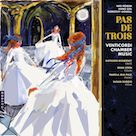

VentiCordi Chamber Music: Pas de Trois
Navona
Records
Titled after Ned Rorem's six-part work, VentiCordi's Pas de Trois is noteworthy for its imaginative programming and unusual trio formats. Founded in 2009, VentiCordi (full name VentiCordi Chamber Music) comprises violinist Dean Stein and oboist Kathleen McNerney, who augment their playing on this release with contributions from pianist Pamela Mia Paul and violist Susan Dubois. The pianist joins Stein and McNerney on Rorem's work and Dorothy Howell's Air, Variations and Finale, while Dubois appears with the duo on Hans Gál's Trio for Oboe, Violin, and Viola, Op. 94. For the record, while the arrangements here include viola and piano, any number of possible configurations is possible in a VentiCordi performance and is determined by the work involved. Adding to the value of this particular release, all three works appear on record for the first time.
When VentiCordi initiated rehearsals of Rorem's Pas de Trois in 2014, the group couldn't believe no one had yet recorded it, and when they discovered the same about the other two pieces, the duo resolved to formally document them. After their plans to record the material with Mia Paul and Dubois were scuttled by the pandemic, they tried again three years later and successfully captured the performances at Berklee College of Music's Boston Conservatory during June 2022.
Educated at the American Conservatory in Chicago, Northwestern University, the Curtis Institute, and Juilliard, Rorem (1923–2022) studied with Aaron Copland and Arthur Honegger, came to know Francis Poulenc and Darius Milhaud, spent time in the United States, France, and Morocco, and was awarded the Gershwin prize in 1948 and the Pulitzer in 1976. Rich in flowing lyrical melodies and a tonal style influenced by French impressionism, his neo-romantic output encompasses orchestral material, choral and chamber works, art songs, and operas. A late work, the twenty-two-minute Pas de Trois was commissioned by the Saratoga Performing Arts Center in honour of his eightieth birthday and features suggestive movement titles that were conceived upon completion. A mood of meditative stillness is induced by “The Palace at Four A.M.,” the piano providing animation and the oboe and violin reflection. As if simulating awakening, the music swells passionately before drifting back to a state of reverie. “Mechanical” then snaps into being with intricate back-and-forth and expressions that alternate between dignified stateliness and aggressive angularity. Rorem's lyrical neo-romantic side comes to the fore during the lustrous “Duet for Three Voices,” in which the instruments sinuously entwine. The quirky “Pas de Trois” drunkenly sways as it wends its way through bright syncopated passages, virtuosic flourishes, and sing-song episodes. Elegiac melancholy pervades "Three Sisters,” with each participant called upon to deliver expressive voicings, after which “The Nursery at Four P.M.” crowns the work with a playful romp that scampers and trills with gleeful abandon.
Born in a small Austrian village, Gál (1890–1987) attended the University of Vienna before serving in WWI. Subsequent to that he taught at the New Vienna Conservatory and was appointed director of the Mainz Conservatory in 1929. Leaving Germany in the wake of Hitler's rise, Gál moved to Britain and was eventually appointed to an academic post at the Edinburgh Music Conservatory, where he stayed until his death. Like Rorem's, Gál's music is distinguished by its embrace of tonality, late-romantic character, incorporation of early twentieth-century influences, and craft, and his Trio for Oboe, Violin and Viola also conveys his love for his adopted home of Scotland, explicitly shown in the tone of its expressive opening “Pastorale” movement and the marking of its fourth, “Introduzione. Meditation on a Scottish Tune.” After the country's subtly evoked in the outdoorsy splendour of the first movement, the jovial second introduces a playfulness that's veritably Stravinskyian in its formal elegance. If the “Intermezzo agitato” feels a trifle anxious and unsettled, the concluding movement beguiles with the wistful ache of its Scottish song and rousing dance moves.
The Birmingham-born Howell (1898–1982) attended the Royal Academy of Music in London in 1914 to study piano and composition and after graduating received attention for her first large-scale orchestral work, the symphonic poem Lamia, which premiered at the 1919 Proms. Rejoining the Royal Academy of Music in 1924 as a Professor of Harmony and Counterpoint, Howell retired from it in 1970, having also taught the Birmingham School of Music from 1950 to 1957. Her Air, Variations & Finale complements the disc's other two pieces in its echoes of impressionism and romanticism. Harmonious and expressive, the ten-minute work seamlessly moves from its graceful “Air” to a panoramic series of explorative variations and finally a breathless, enchanting “Finale.” The sumptuous chamber trios McNerney and Stein produce with their partners on this release make for a satisfying recording and rewarding listening experience. It'll be interesting to see which composers they select for their next innovative project, not to mention who they choose as collaborative musical partners.May 2025